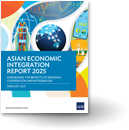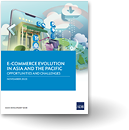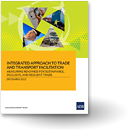Exploring the possibility of closer People’s Republic of China-Central Asia trade relations
Even as regional integration initiatives continue to progress at warp speed globally, Central Asia’s progress has been halting. For countries in the Caucuses region in particular, bilateral free trade agreements connect each of the countries to their neighbors. However, historical differences between Armenia and Azerbaijan have limited implementation. Could recent changes in trade patterns remove this roadblock?
Trade between the People’s Republic of China (PRC) and Central Asia hit $46 billion in 2012. This new source of growth represents a balance to the region’s traditional trading partner, Russia. In their efforts to sustain the relationship, the Caucuses countries have begun exploring the potential for a formal trade agreement with the PRC. In this blog we suggest that such an agreement might address existing challenges to implementation of existing regional integration agreements.
The Caucuses countries of Armenia, Azerbaijan and Georgia have all seen a strengthening of their trade relationship with the PRC in recent years (see Table 1). The PRC was Armenia’s largest trading partner in 2010. PRC trade with Azerbaijan increased 17.6% in 2012 alone. Recently, the PRC announced it would invest $1.7 billion in Georgia over the next five years. In all cases, PRC investment and trade is focused on natural resource sectors including mining, oil field development and timber (see Table 2).
Table 1. Exports/Imports from Armenia, Azerbaijan, and Georgia
to the PRC, 2010–2012 (US$ million)
|
|
2010 |
2011 |
2012 |
|||
|
Country |
Imports |
Exports |
Imports |
Exports |
Imports |
Exports |
|
Armenia |
402 |
30 |
402 |
13 |
397 |
31 |
|
Azerbaijan |
588 |
339 |
N/A |
N/A |
632 |
183 |
|
Georgia |
334 |
24 |
525 |
28 |
566 |
25 |
N/A = not available; PRC = People’s Republic of China.
Source: World Integrated Trade Solution
Table 2. Major Products, Exports and Imports to and from the PRC (2010)
|
|
Exports to |
Imports from |
| Armenia |
ore slag and ash; beverages, spirits, and vinegars; articles of stones; plastics and articles thereof |
electrical machinery and equipment and parts; telecommunications equipment; sound recorders; television recorders; nuclear reactors; boilers; machinery and mechanical appliances; computers; furniture, bedding, and cushions; lamps and lighting fixtures; illuminated signs; nameplates; prefabricated buildings; footwear and hosiery; optical, photographic, measuring, precision, medical, or surgical instruments and accessories; apparel and clothing accessories (not knitted or crocheted), products of iron or steel; ceramic products; and plastics and articles thereof |
|
Azerbaijan |
mineral fuels and oils, plastics and articles thereof, and aluminum |
nuclear reactors; boilers; machinery and mechanical appliances; computers; electrical machinery and equipment and parts; telecommunications equipment; sound recorders; television recorders; glass and glassware; products of iron or steel; vehicles excluding railway; optical, photographic, measuring, precision, medical, or surgical instruments and accessories; plastic and articles thereof; apparel and clothing accessories (not knitted or crocheted), zinc and articles thereof; and rubbers and articles thereof. |
|
Georgia |
copper and articles thereof; beverages, spirits, and vinegar; and lead and articles |
electrical machinery and equipment and parts; telecommunications equipment; sound recorders; television recorders; nuclear reactors; boilers; machinery and mechanical appliances; computers; furniture, bedding, and cushions; lamps and lighting fixtures; illuminated signs; nameplates; prefabricated buildings; footwear and hosiery; ceramic products; apparel and clothing accessories (not knitted or crocheted), apparel and clothing accessories (knitted or crocheted), plastic and articles thereof; toys; games and sports equipment; parts and accessories; vehicles excluding railway; wood and articles of wood; wood charcoal; and products of iron or steel. |
PRC = People’s Republic of China
Source: www.unctad.org
A formal trade agreement among all of the Caucuses counties and the PRC would be an opportunity to harmonize conflicting standards and smooth trade both among countries in the region and between PRC and the region. PRC has invested heavily in all three countries, yet their business climate ratings indicate that domestic challenges remain (see Table 3). Georgia is the best performer with an overall 2013 rank of 9/189, followed by Armenia at 40/189 and trailed by Azerbaijan at 71/189. The growth of PRC’s investment despite lack of harmonization of standards and bottlenecks at the domestic level suggest that improvements could free up additional flows.
Table 3. World Bank Doing Business indicators (selected) 2013 (ranked out of 189)
|
|
Protecting investors |
Trading across borders |
Enforcing contracts |
|
Armenia |
21 |
116 |
117 |
|
Azerbaijan |
21 |
169 |
27 |
|
Georgia |
16 |
45 |
33 |
Source: World Bank
An agreement would also offer an opportunity for countries to diversify their exports. This has been a challenge for many transition economies which continue to have highly concentrated exports. Based on a survey of their current exports, each of the Caucuses has a revealed comparative advantage (RCA) in its trade with the PRC in both traditional and non-traditional bilateral exports. Table 4 lists the products with the highest RCA values. Both Armenia and Georgia have a RCA in 52 products among 97 (based on HS-6 digit code), whereas Azerbaijan has a RCA in 31 products.
Table 4. Revealed Comparative Advantage for Armenia, Azerbaijan and Georgia
|
Armenia |
Azerbaijan |
Georgia |
|
|
|
Source: Authors computations
For the PRC, greater trade with the region presents two important benefits. First, these countries provide a gateway to the Russian, Ukrainian and Iranian markets. Currently these markets are served by the growing presence of Turkey and Iran, but have little PRC involvement. Second, the limited engagement of Central Asia outside of its direct neighbors offers a domestic environment ripe for new investment and entrepreneurship.
The Caucuses countries have long understood the potential benefits of formal regional integration. This is illustrated by the agreements that crisscross the region. Armenia has 7 FTAs, Azerbaijan has 4 and Georgia has 8. Yet none has yet expanded beyond regional borders. Even without formal preferences, trade and investment from the PRC has increased rapidly within the region. A formal agreement could be a useful next step both to sustain this relationship and also to create a framework for regional trade that addresses some of the political roadblocks that continue to exist.




